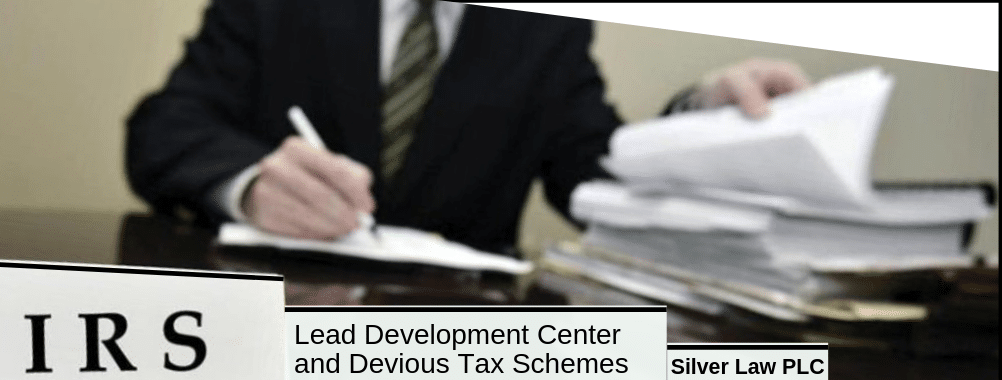When Can Overdue Corporate Taxes Lead to Personal Liability? Corporations are obligated to pay a…
Taxes are big money. That’s why you have so many people out there trying to scam taxpayers out of their money, and that’s why you have so many taxpayers trying to avoid paying their taxes. Too many people are looking at how they can exploit the system to either make or save a buck.
That’s also why the IRS is doing everything it can to crack down on frauds. The agency has created the Lead Development Center to combat tax abuse, partially by identifying those tax “professionals” who are helping taxpayers avoid their full obligations or who are trying to take advantage of taxpayers to get more of their money.

One way that the IRS is able to identify unscrupulous practices is by following up on referrals made by others. The IRS looks at referrals both inside and outside its organization, meaning that it also investigates fraud within its own ranks.
Officials with the Lead Development Center follow up on each referral made about tax schemes, abusive tax preparers or other tax officials, and fraudulent taxpayers.
Officials with the Lead Development Center don’t just make a few inquiries into information they get on referral. They usually delve into a full civil investigation, depending on the information they initially uncover. Specially trained agents perform the investigations to gather witness testimony and tangible proof, including documentation, financial account records, and more.
Agents may also conduct investigations based on their own information – even if they have not received a referral. Civil investigations can lead to fines and other penalties, including civil injunctions.
In some cases, taxpayers may make mistakes on their returns that work out in their favor. If an investigation shows that this is the case, the taxpayer is likely to have to pay a fine and the delinquent debt. However, if the investigation shows that the person willfully engaged in fraud or evasion, criminal charges can be brought.
The same is true for tax professionals. A civil investigation may show that the taxpayer did not know about the mistakes being made on their behalf, and then the office may conduct a criminal investigation into the tax professional. These investigations often look into “too good to be true” promises, as well as unethical and illegal means of reducing a taxpayer’s obligation. Criminal convictions can result in much more serious fines and penalties, including prison time and loss of professional licensing.
Once investigations are closed, agents with the Lead Development Center continue to follow up to be sure that no unethical behavior is taking place. Agents ensure that taxpayers and tax professionals remain in compliance with the law and any court orders that were imposed against them. If a breach is discovered, additional charges can be brought and penalties levied.
Besides investigating reports of tax fraud and abuse, the Lead Development Center also works to educate the public about tax schemes and about the consequences of such schemes or of tax abuse. Education and awareness is especially important for taxpayers, who often put their trust in tax professionals. They believe that these professionals are operating within the law since they are experienced and are often licensed. It’s important that taxpayers know what signs to watch for so they do not become victims of such people and do not inadvertently face penalties themselves.
If you have fallen victim to a tax scheme, the tax attorneys at Silver Law PLC in Phoenix may be able to help you. Our attorneys represent clients in civil and criminal tax matters, whether they have been accused of wrongdoing themselves or they have been the victim of it.
Our tax attorneys in Arizona will review your documents, audit your tax returns, and look for whatever other evidence is needed to either prove your innocence or reduce the charges against you (and their penalties). We also represent clients who are being audited, who are seeking innocent spouse relief, who are dealing with foreign tax reporting, and more. Our attorneys have all worked as tax lawyers for the IRS in the past, which gives them valuable insights for defending your case. Contact us in Arizona to talk with a tax lawyer in Phoenix about your case today.
Arizona Location
7033 E. Greenway Pkwy, Ste 200
Scottsdale, AZ 85254
Office:(480) 429-3360
Website: taxcontroversy.com
Nevada Location
410 South Rampart Blvd, Suite 390
Las Vegas, Nevada 89145
Office: 702-318-7130
Website: taxcontroversy.com
How Do I Handle a Criminal Tax Investigation By The IRS? Paying taxes is a…
Recent Injunctions Updates To Beneficial Ownership Reporting Requirements Breaking Down The Latest Changes To BOI…
What Should I Do If I Disagree With The Outcome Of An IRS Audit? Learn…
4 Tax Schemes From The IRS's "Dirty Dozen" List That Can Get The Average Taxpayer…